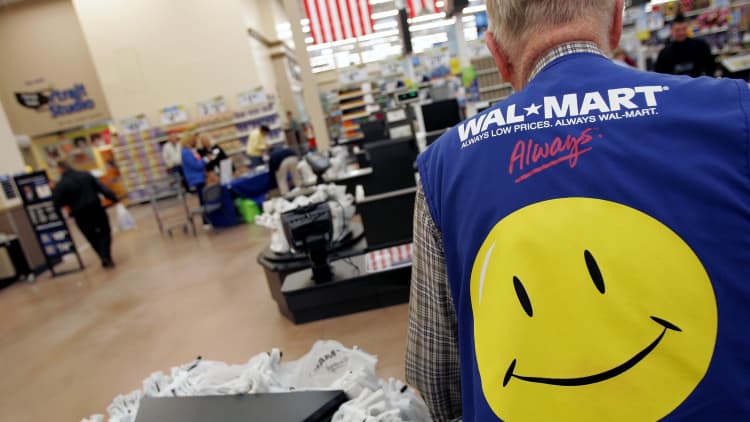In September of 2019, behemoth retailer Walmart announced its goal to become "America's Neighborhood Health Destination" and launched its first Walmart Health center in Dallas, Georgia.
The center offers primary care, labs, X-rays, EKG scans, counseling, dental, optical, hearing and community health education services for cheap. Shoppers can get a medical checkup for $30, a teeth cleaning for $25 and a mental health consultation for $1 a minute, without insurance.
For comparison, researchers from Johns Hopkins University's School of Public Health estimate that the average price of a doctor's visit for a new uninsured patient is about $160.
According to John Sculley, who served as Apple's CEO from 1983 to 1993 and currently serves as chairman of pharmacy benefit management company RxAdvance, these prices, and the convenience of providing healthcare at a well-known location, is going to cause a "consumer revolution."
"We're going to have a consumer revolution in retail for point of care," Sculley tells CNBC Make It. "Why? Because if the Walmart tests are successful, and I suspect they will be, people will be able to go in and get these kinds of health services at a lower cost than if they had health insurance."
He continues, "Think about that. They're still nearly 30 million people who don't have health insurance. A lot of these people are going to go to a Walmart where you get these kinds of routine services. That's going to be a dramatic change."
Sculley points out that Walmart is far from the only retailer attempting to become the place where patients receive their healthcare, listing CVS, Walgreens and BestBuy as other retailers that are vying to be that place.
"CVS is probably the furthest along of anyone," says Sculley. "They have over 1,300 of these 'Minute Clinics' as they call them, they own one of the largest PBMs (pharmacy benefit managers), they own their own health insurance company and they own CVS stores."
He adds that technology companies are also eyeing the health-care industry space.
"Big tech companies like HP and Amazon and Apple and Google and Microsoft all realize that this is the largest remaining industry that has not been revolutionized by modern technologies that has transformed every other big industry in the United States," he notes.
According to Sculley, corporate lobbying and necessary regulation are some of the reasons health care has been slow to transform, estimating that the health care and pharmaceutical industries spend around $154 million and $240 million per year on political lobbyists, respectively.
According to The Center for Responsive Politics, the pharmaceutical industry spends $280 million per year on political lobbying, more on lobbying than any other industry.
Lobbying is "one of the reasons why the health-care system in the U.S. is twice as expensive per-capita as even the most expensive plans outside the U.S. — the U.K., Europe, Singapore, Canada," says Sculley. "And then you have compliance in health care, which you would expect because you're talking about people's lives. It's extremely important. And so the health-care industry cannot make mistakes. For these reasons, the health-care industry has been the last really big industry to adopt the kinds of technologies that have completely transformed telecommunications, financial services, retail, and other types of services."
But Sculley has seen industries overcome these kinds of forces before.
Prior to serving as the CEO of Apple, Sculley was the chief executive at Pepsi. During that time, he remembers observing how mass merchandisers like Walmart, Lowe's and Kmart disrupted the retail industry and how McDonald's and Wendy's disrupted the food and beverage industry. He believes the same disruption is happening in the health-care industry today.
"There's no question in my mind," he says.
Check out: The best credit cards of 2020 could earn you over $1,000 in 5 years



